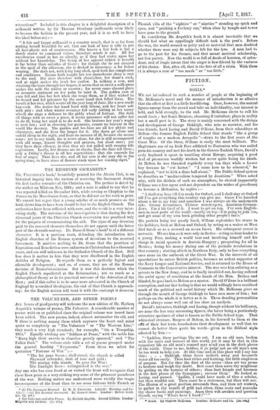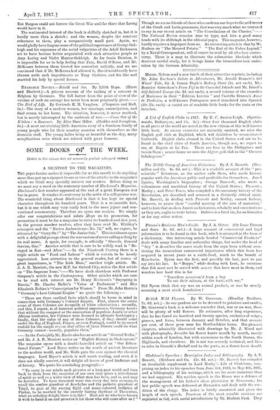FICTION.
WE are introduced to such a number of people at the beginning of Mr. McKenna's novel and the manner of introduction is so allusive that the effect at first is a little bewildering. Once, however, the central figures emerge from the crowd and take on individuality, our interest is held, and held strongly, to the end. Mr. McKenna elects to call his novel 'onia ; but Sonia Dainton, charming if turbulent, plays in reality but a small part in it. The story is mainly concerned with the doings and development of George Oakleigh, who acts as narrator, and his two friends, Lord Loring and David O'Rane, from their schooldays at Melton—tho famous English Public School that stands " like a group of temples on a modern Acropolis "—down to the first years of the Great War. Of the three, O'Rane is easily the most brilliant. The illegitimate son of an Irish Peer addicted to Fenianism who was exiled from his country and met his death in the Graeco-Turkish Wars, David's early boyhood is spent in tumbling about Europe, acquiring a good deal of premature worldly wisdom but never quite losing his ideals. At Melton he was thrashed regularly every ten days while a Lower boy because he " cut footer." " I came here to bo educated," he explained, " not to kick a dime ball about." The Public School system he describes as " mediacvalism tempered by Jesuitism." When asked why, with his disdain of such an atmosphere, he elected (apparently O'Rane was a free agent and not dependent oa the wishes of guardians) to become a Meltonian, he replies :—
" I shall stay here till I'm ready for Oxford, and I shall stay at Oxford till I've got everything this country can give me. Guess I've knocked about a bit in my time and somehow I was always on the underneath side. Greasy Levantines, Chinese storekeepers, American-German- Jews. I'm a bit tired of it. I want to get on top. I've seen English. men in most parts of the world—mostly on top—I'm going to join 'em, and get some of my own back grinding other people's faces."
His pockets being but poorly lined, O'Rane replenishes his stores in the holidays, both at Melton and Oxford, by acting as a waiter at West End hotels or as a steward on ocean liners. His subsequent career is meteoric. We see him as it were only in Sashes—acting as bear-leader to a young Peer, making a world tour and involving himself and his charge in racial quarrels in Austria-Hungary ; prospecting for oil in Mexico ; losing his money during one of the periodic revolutions in that country ; starting afresh in Northern Italy, only to lose everything once more on the outbreak of the Great War. In the intervals of oil speculations he enters British politics, becomes an ardent supporter of the Navy League and National Service, and is returned to the House of Commons in the Conservative interest. The war sees him enlisting as a private in the New Army, and he is finally invalided out, having suffered the awful agony of crucifixion at the hands of the Hun. Broken and blinded, he goes back to Melton as a master. David O'Rane is a brilliant conception, and our first feeling is that we would willingly have sacrificed much of the political and social history which Mr. McKenna gives us through the mouth of George Oakleigh to have seen more of him ; but perhaps on the whole it is better as it is. These dazzling personalities do not always come well out of too close an analysis.
David's intimates, Oakleigh and Loring, though without his brilliancy, are none the less very interesting figures, the latter being a particularly attractive specimen of what is known as the Public School type. That whimsical creature, Burgess of Melton, in his farewell to them at the effd of their last term, foreshadows their development so well that we cannot do better than quote his words—given in the Biblical style affected by him :—
"‘ Laddies, these partings like me not. I am an old man, broken with the cares and sorrows of this world, yet it may be that in this transitory life an old man's counsel may avail you in the dark places of the earth. Come to me, laddies, if ye judge not an old man's arm be too weak to help you. At this time and in this place will I say but this : . . . Oakleigh, thine heart moltcth away and beeometh water all too easily. Thou halt riches and learning, but little singleness of purpose. Not for thee the dust of the arena—thou art too prone to hesitate and weigh thy doubt. Best canst thou serve thy neighbour by girding on the harness of others ; thou halt friends and kinsmen in the first places of the Synagogue ; succour them.' He looked at Loring, and paused. Laddie, I could have made of thee a scholar, but thou wouldst not. Thou canst be a statesman, but thou wilt not. The illusion of a great position surrounds thee, and thou art content, to gather in thy vessels of gold and silver, thine ivory and peacocks thy choice books and paintings. Anon thou wilt awaken and question thyself, saying "Where have I lived ? " ' " • . sows. By Stephen McKenna. London: Methuen and Co. LOs. netvl
But Burgess could not foresee the Great War and the share that Loring would have in it.
The sentimental interest of the book is skilfully sketched in, but it is hardly more than a sketch ; and the women, despite the constant references to them, play a comparatively small part. Again, we would gladly have forgone some of the political experiences of George Oak- leigh and his exposures of the social vulgarities of the Adolf Erckmann set to have become better acquainted with such attractive people as Amy Loring and Violet Hunter-Oaklcigh. As for Sonia Dainton, it is impossible for us to help feeling that Fate, David O'Rane, and Mr. McKenna between them treated her somewhat unfairly, and wo are convinced that if Mr. McKenna had allowed it, David would easily have thrown aside such impedimenta as Tony Crabtree and his like and married his lady by special licence.



























 Previous page
Previous page